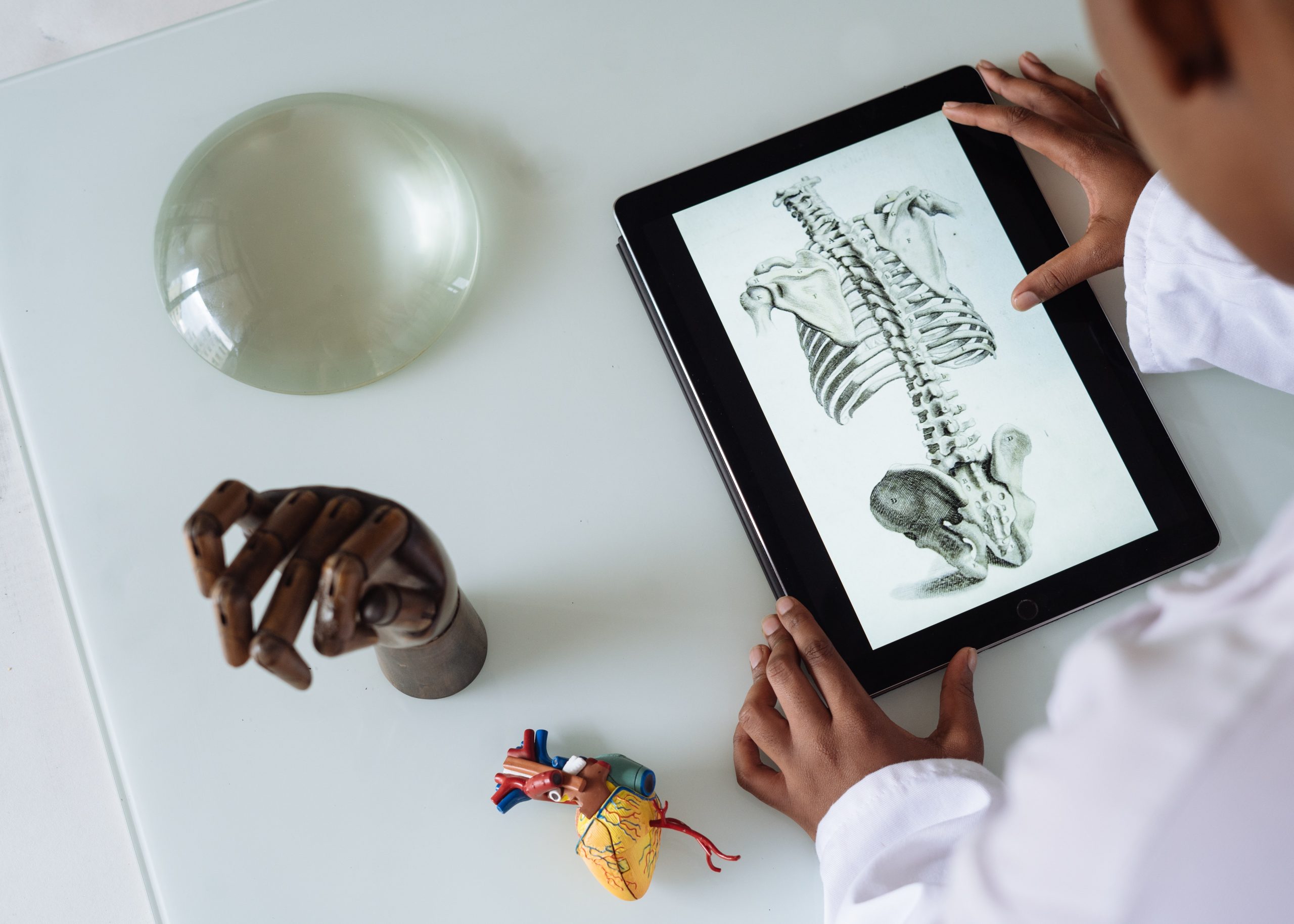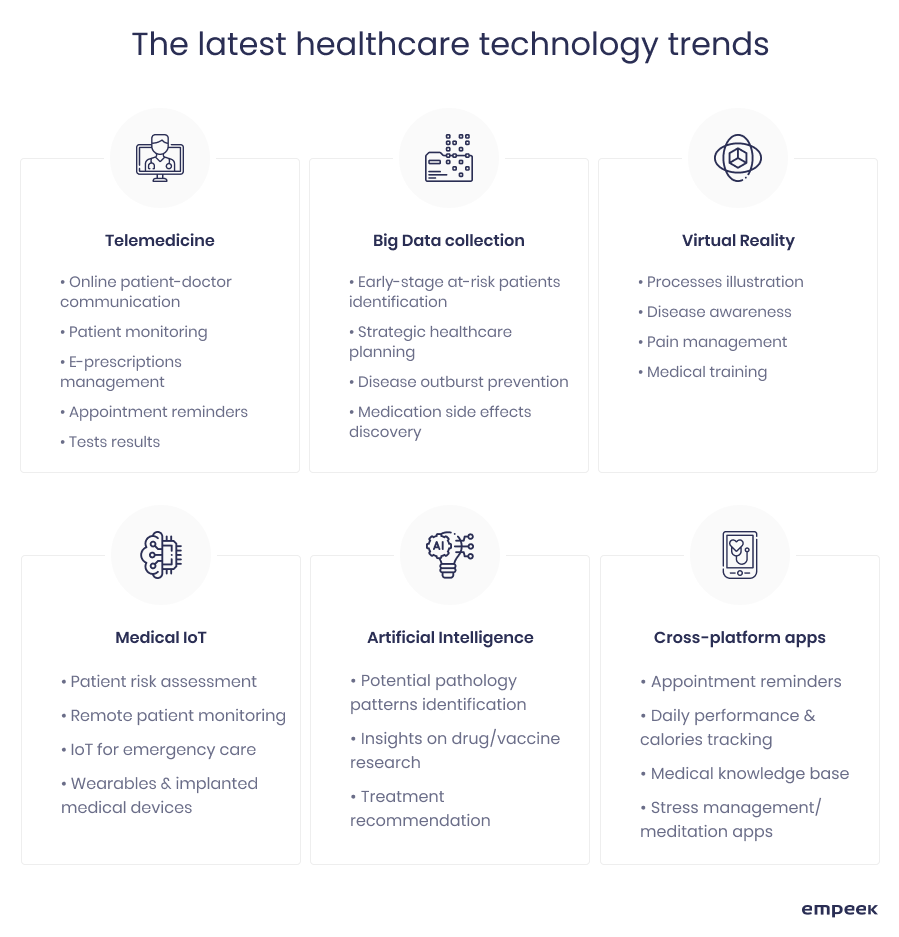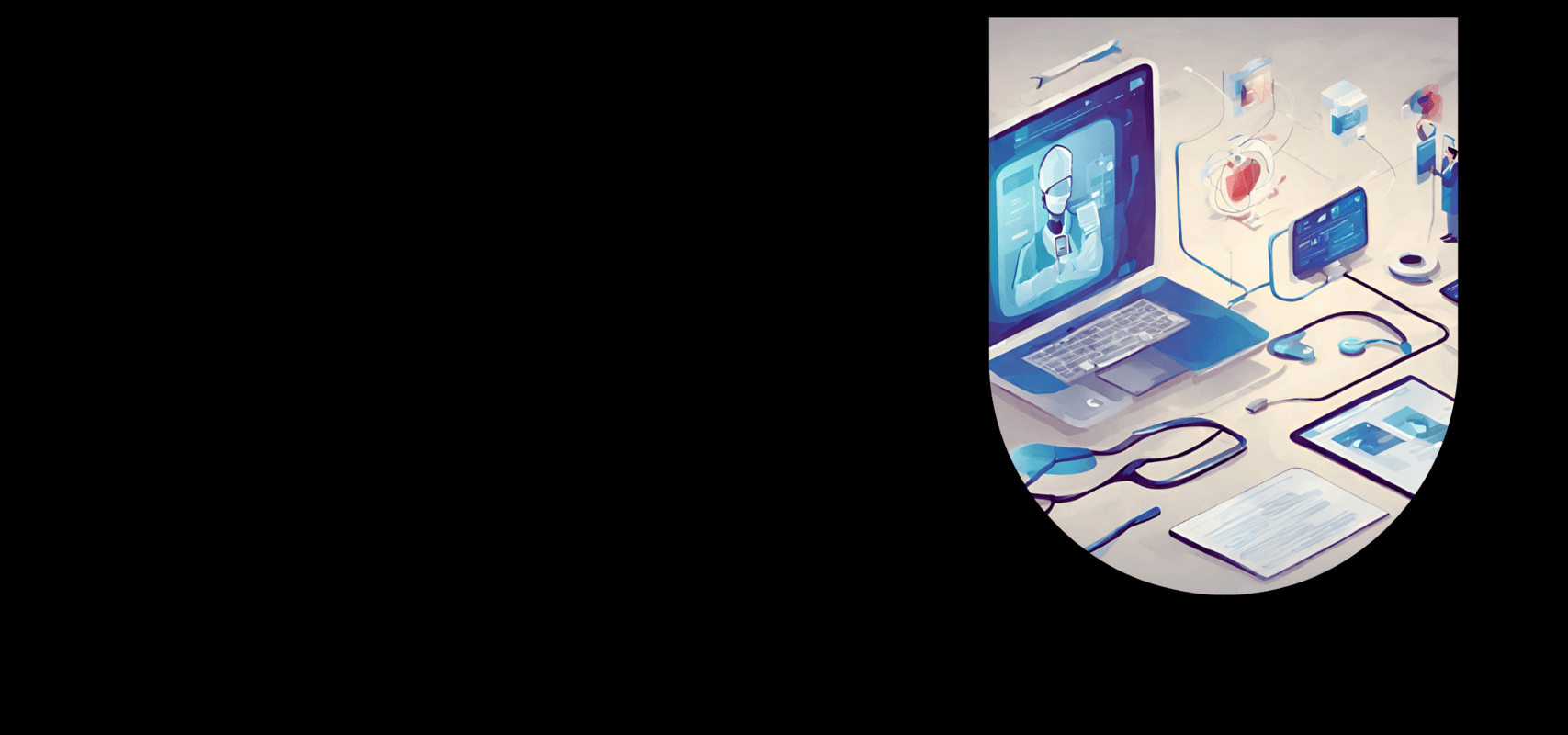Technology is often regarded as the most powerful driver of change in every sphere. Think of it: we now can work from home, bank or trade with our phones, and even visit the world’s most popular museums without leaving the room.
The digitizing processes didn’t skip its turn in bringing healthcare closer to its end-users either. Now, due to software for medical devices, we can track our temperature, see the activity dynamics, control the heart rate, blood sugar level, and many other things. The providers, on the other side, got more access to make the treatment process fast and reduce potential mistakes.

But are these the sole examples of how digital transformation in healthcare is shaping the interaction between providers and patients? As it turned out, digitalization in healthcare is way more influential than that. In this article, we’ll discuss what the digital transformation of healthcare is, how its mobile-based, and cloud-based software solutions for pharmacy impact the providers and recipients of the medical services, and what are the benefits of mhealth ecosystem.
What Is Digital Transformation in Healthcare
Digital transformation in healthcare is a mix of processes aimed at enabling healthcare services or procedures with the help of electronic devices (including wearables) and particular software.
For instance, the doctors are now able to stream their operations to teach their colleagues throughout the world, to say nothing about the da Vinci™ surgical systems that the surgeons use to make the operations less invasive. The data that doctors collect from the patient has become more accessible to the end-user and helps to prevent many diseases if interpreted correctly. Of course, none of that would be available without a computerized solution like AI-powered software.
Let’s view the most common novelties that digital transformation in healthcare industry brought us.

If used by every provider and patient, digital solutions have the potential to make healthcare simple, affordable, and more effective. However, making them mobile-first will cover the needs of more people since the demand for the mobile devices is growing exponentially. As a result, the healthcare provision will be easily accessible.
Let’s show how to automate paper processes in healthcare and why we think the healthcare digital transformation will only continue to revolutionize the whole medical system.
Impact and Role of Digital Transformation in Healthcare
The current Mobile Health (mHealth) market is expected to grow at a rate of 28.8% from USD 40.59 billion in 2019 to USD 310.37 billion in 2027. This will be a stunning 7x increase in just 8 years. Many initiatives from both government-controlled and private companies have the “digitization of healthcare” in their strategic planning, all with the sole aim: to make the service provision patient-centered.
This includes:
- Empowering patients with their health available at their fingertips
- Reducing medical expenses by introducing preventive and cost-effective treatment, visits, and care
- Increasing access to patient’s health information for doctors, hospitals, and clinics
- Promoting patient’s outcome improvement through fact-based decision-making
- Supplying data for predictive modeling of the at-risk population, and thus improving preventive care
Certain elements of e-prescribing software make the healthcare industry step forward. Provided universally, the patient-centered approach can revolutionize the way we get medical treatment and lead the way for effective healthcare available worldwide. What are the current healthcare technology trends and tendencies of the digital health market regarding the transformation? Let’s review them in detail.
Current Digital Strategy Trends in mHealth Industry
Leading-edge mobile health solutions are defined by numerous technology-driven trends. Some examples of them are provided below.
Mobile-based on-demand healthcare
Whether it’s scheduling an appointment, doctors researching or the insurance coverage checking, people want to get it all just as easy as they order from Amazon via their smartphones. There is already an online marketplace that allows doctors and nurses to live the ‘nomad’ working life i.e. to work shifts at the facilities that are in high demand from the last-minute patients. This practice could make on-demand ad-hoc appointments a reality, which will unload the hospitals and allow more flexibility for busy patients.
Big data for predictive healthcare
Big data can be a game-changer for many healthcare institutions since it can be used for:
- Tracing inconsistencies to reduce human errors;
- Planning preventive care to minimize the returning ER patients;
- Facility planning and accurate staffing to cover the needs of all patients throughout the country;
- Identifying the at-risk population to prevent the epidemics (like it happened during the Ebola outbreak when the federal government used Big Data to prevent spreading of the disease).
The current healthcare industry digital transformation involves a load of sensitive data. This is why the service providers face strict regulations concerning storing and collecting the patient’s data.
VR treatment
Virtual reality is a recent invention used in various spheres like gaming and education, and it’s also proven to be effective for treating patients with migraines. VR devices are pretty common these days and the patients can substitute their usual painkillers (which are often habit-forming ones) with VR sessions. And yes, it can be available for the patient on demand.
VR technologies are now widely used by surgeons during the training, which led to a 230% performance efficiency increase compared to the traditional one. Plus, they proved its efficacy during the labor pain administration, anxiety relief, and faster physical recovery.
Read also: AR & VR in Healthcare
Mobile electronic devices paired with medical software
56.3% of the mHealth market is taken by mobile apps of various kinds from tracking the activity to period apps to those that are connected with the implantable devices. The wearable device market share will experience a stunning 6x times increase – from $14,44bn in 2019 to $89,45 bn in 2027. The reason? Their long-term benefit for the patients. When used by at-risk patients, medical IoT solutions can prevent the occurrence of major health events that can have life-threatening consequences for the at-risk patient.

The common wearables include:
- Exercise trackers;
- Heart sensors (paired with the diagnostic software);
- Blood sugar testers;
- Oximeters;
- Insulin pumps;
- Portable Oxygen concentrator;
- Sleep trackers, etc.
As Empeek’s case study for wireless real-time medical monitoring shows, the development of accurate mobile-based technology paired with medical wearables will enhance the real-time measurements of the patient’s indicators. Plus, it works as a reminder, allows for personalized surveys, and empowers the medical workers with the information they need to provide a customized treatment in less time.
AI-powered tools
These include the rise of nurse robots that Japan and the States have successfully implemented to assist the nurses with physical routines like fetching and supplying. Another thing that is more connected with the mHealth market is chatbot technology, which is widely used in various health care departments. You can interact with them when you contact the hospital support, undergo diagnostic, or visit the therapist. Many pharmaceutical companies like BioXcel Therapeutics use AI to identify and develop new medicines in the fields of immuno-oncology and neuroscience.
However, the biggest promising thing about AI programs concerns oncology. The human eye can miss some of the pathology patterns. However, with precise AI analysis, they can be found out at the early stages and help the doctors to prevent their further development. Like the Freenome does for screenings, diagnostic tests and blood work to test for cancer.

Electronic Health Records available in a smartphone
Data breach always entails deplorable consequences for the patient’s privacy and provider’s reputation. The most sought-after digital transformation trend in healthcare is switching to a fully electronic patient record system that could be used cross-platform. This is where blockchain technologies with decentralized networks step into the game and make an impact. Plus, there are startups like Medicalchain that make the doctors and insurance companies request information from the patient’s EHR and put the patient in control.
In 2019, Apple did a pilot project with their Health Records apps that allowed exchanging the information from the doctor’s database to the patient’s phone. This will change the course for many health organizations, especially taking into account the recent rule from the Office of the National Coordinator for Health IT, ONC stated that EHRs will have to include FHIR application programming interfaces (APIs) that allow patients to access their records.
As you see, the trends are plenty and they continue developing daily by the IoT startups and software vendors. But what immediate and long-run benefit of digital transformation in healthcare can they bring for the healthcare providers and patients?
The Benefits of Digital Transformation in Healthcare for Patients and Providers
Although they belong to different camps, both providers and patients have an interest in healthcare processes that are easy, accessible, cost-effective, and efficient. So, how does every digital solution we talked about earlier benefit the providers and patients?
What is digital transformation in healthcare: provider’s perspective
More accessible telemedicine
The rapid pharmacy preceptor development is step zero for providing every person with effective initial healthcare. With the proper network and mobile device, doctors can provide initial consultations at a low cost, helping out the low-income patients or those living far from the hospitals. In this way, it will be possible for providers to cover the needs of patients beyond the metropolitan areas.
More accurate EHRs available in mobile devices
With a variety of mobile devices, speech-to-text programs, and many other technologies, the providers are empowered with the precision of adding the medical entries by voice. This shortens the appointment time and still makes every note being added. This is crucial for keeping the information about one’s health as complete and correct as possible. Besides, the rising promise of making it available cross-network will give the new providers the benefit of having a full clinical picture of the patients even if they just became the clients.
More effective management
Every provider wants to manage the services, staff, and patient flow cost-effectively. Collecting the data from the patients and the doctors will help the management to tailor their services to the client’s needs. Additionally, it will give a real-time insight into the market and allow for shaping a long-term digital strategy.
Online diagnosis of at-risk patients
Online diagnosis of at-risk patients especially concerns the patients with implantable devices like cardiac pacemakers, implantable cardiac defibrillators (ICDs), coronary stents, hip implants, interocular lenses, and implantable insulin pumps. Their diagnostic and receiving the maintenance alerts can be done without the patient visiting the doctor’s office, which will cut spendings on the maintenance of the public areas at the hospitals and free the cabinets for those who require in-patient care.
More focus on patients
Because the software and AI will assist in filling in the health records, doctors will be able spend more time inquiring patients about their health and habits. This communication can lead to a better understanding of the clinical picture, improving the care quality, and establishing trustful doctor-patient relationships. As a result, the patient’s satisfaction rate will increase greatly.
More research
The data has no value without a thorough analysis and interpretation. By receiving the health alerts, analyzing patterns, identifying the common conditions and events frequency, the doctors have invaluable material for discoveries and innovation. For instance, the collected information about the prescribed drugs can reveal the common side effects, identify if it’s a habit-forming one, and find the substitute if needed. Get more insights on our recently developed project drug testing software system.
Research, accessibility, efficacy, and automation – these are the core benefits of digital transformation in healthcare for medical workers. Let’s see what’s good for the patients.
Benefits of Healthcare Digitalization for Patients
On-demand healthcare
It includes accessible and affordable telemedicine, searching of the insurance-accepted providers, making last-minute appointments, and much more. The ability to have it as easy as grocery delivery is nothing else but making healthcare fit a patient’s schedule and budget.
Active involvement in the process
Because smartphones are always with them, the patients are more likely to control their lifestyle and correct it if there is a medical need for that. For instance, one can control the consumption of fats and carbs by changing the diet, and the app gamification will make the transition period easier.
More peace of mind
One of the biggest concerns for those having an implantable device is that it might stop working one day, which may end up badly for the patient. Being able to diagnose patient condition regularly thanks to implanted devices decreases the chance of unpredictable circumstances occurring and allows people to live a healthy, active, and less stressful life.
More control of data usage
Privacy is precious, and one has a full right to know how the information is being used and control the access to the sensitive data. We predict that if the blockchain technologies will be used widely, the patients’ information will be breach-proof, which will enhance one’s ID security.
Final Thoughts
Digitalization has an immense impact on the healthcare systems throughout the world, and emerging technologies only move this process forward. Because of the implementation of digital platform solutions like EHRs, AI-powered programs, mHealth and telehealth devices, and medical wearables, the medical care quality and accessibility is becoming better, more affordable, and on-demand. Visit the additional article on the barriers to mhealth adoption.
At Empeek, we are dedicated to making the digitalization of healthcare a worldwide practice by developing custom medical software to empower the providers and patients with real-time knowledge. Contact us today and we’ll discuss how you can improve the healthcare delivery with us!








